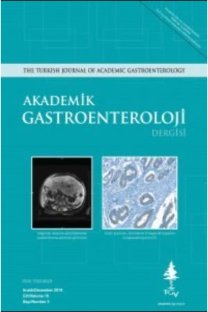Kolorektal kanserde, p21, p27, p57 siklin bağımlı kinaz inhibitör geni (CDKI) ekspresyonlarının değerlendirilmesi
Gen ekspresyonu, Siklin-bağımlı kinaz inhibitör proteinleri, Siklin-bağımlı kinaz inhibitör p21, Ters transkriptaz polimeraz zincir reaksiyonu, Siklin-bağımlı kinaz inhibitör p27, Kolorektal neoplazmlar, Siklin-bağımlı kinaz inhibitör p57
The detection of p21, p27, p57 cyclin dependent kinase inhibitor gene (CDKI) expression in colorectal cancer
Gene Expression, Cyclin-Dependent Kinase Inhibitor Proteins, Cyclin-Dependent Kinase Inhibitor p21, Reverse Transcriptase Polymerase Chain Reaction, Cyclin-Dependent Kinase Inhibitor p27, Colorectal Neoplasms, Cyclin-Dependent Kinase Inhibitor p57,
___
- 1.Weitz J, Koch M, Debus J and et al. Colorectal Cancer, Lancet 2005; 365:153-65.
- 2.Robins SL, Kumar V, Basic Pathology. W.B. Sounders Company, West Washington Square, PA, USA, 1987. p:718-31
- 3.Rashid A, Houlihan PS, Booker S and et al. Phenotypic and Molecular Characteristics of Hyper plastic Polyposis. Gastroenterology 2000; 119:323-32.
- 4.Ponz de Leon M, Di Gregorio C. Pathology of Colorectal Cancer. Digest Liver Dis, 2001; 33:372-86
- 5.Decker BC. Published, Cancer Medicine. Hamilton, Ontorio, 2003. [www.bcdecker.com] Erişim: I Mayıs 2005
- 6.Cai K, Dynlacht BD. Activity and Natur of p21WAFl Complexes During the Cell Cycle. PNAS 1998; 95:12254-9.
- 7.Alberts A, Johnson A, Lewis J and et al. Molecular Biology of The Cell. Garland Science, New York, USA, 2002. p: 983-1027.
- 8.Zieske JD. Expression of Cyclin-Dependent Kinase Inhibitors During Cornea! Wound Repair. Progression in Retinal and Eye Research 2000; 19: 257-70.
- 9.Tsihlias J, Kapusta L, Singerland J. The Prognostic Significance of Altered Cyclin-Dependent Kinase Inhibitors in Human Cancer. Anneual Review of Medicine 1999; 50:401-23.
- 10.Sherr CJ. Cancer Cell Cycles. Science 1996; 274:19672-7
- 11.Lewin B. Genes VI. Oxford University Press, New York, USA, 1997. p:1089-129.
- 12.Gartel AL, Serfas MS, Tyner AL. p21-Negative Regulator of the Cell Cycle. Proceedings of the Society for Experimental Biology and Medicine 1996; 213(2): 138-49.
- 13.Nakanishi M, Kaneko Y, Matsushime H and et al. Direct Interaction ofp21 Cyclin-Dependent Kinase Inhibitor with the Retinoblastoma Tumor Suppressor Protein. Biochemical and Biophysical Research Communications 1999; 263: 35-40.
- 14.Nho RS, SheaffRJ. p27Kipl Contributions to Cancer. Progression in Cell Cycle Research 2003; 5: 249-59.
- 15.Deschenes C, Vezina A, Beaulieu JF and et al. Role ofp27Kipl in Human Intestinal Cell Differentiation. Gastroenterology 2001; 120: 423-38.
- 16.Bastions H, Townsley FM, Ruderman JV. The Cyclin-Dependent Kinase Inhibitor p27Kip 1 Induces N-terminal Proteolytic Cleavage of Cyclin A. PNAS 1998; 95: 5374-81.
- 17.Adams PD, Kaelin WG. Negative Control Elements of the Cell Cycle in Human Tumors. Current Opinion in Cell Biology 1998; 10:791-7.
- 18.Genç S, Kızıldağ S, Genç K and et al. Interferon Gamma and Lipopolysaccharide Upregulate TNF-Related Apoptosis-Inducing Ligand Expression in Murine Microglia. Immunology Letters 2003; 85: 271-4.
- 19.Tsunehiro I, Satomi Y, Katoh D and et al. Induction of Cell Cycle Arrest and p21CIPl/WAFl Expression in Human Lung Cancer Cells by Isoliquiritigenin. Cancer Letters 2004; 207: 27-35.
- 20.Shin JY, Kim HS, Park J and et al. Mechanism for Inactivation of the KIP Family Cyclin-Dependent Kinase Inhibitor Genes in Gastric Cancer Cells. Cancer Research 2000; 60: 262-5.
- 21.Chen CL, Ip SM, Cheng D and et al. p73 Gene Expression in Ovarian Cancer Tissues and Cell Lines. Clinical Cancer Research 2000; 6: 3910-5.
- ISSN: 1303-6629
- Yayın Aralığı: Yılda 3 Sayı
- Başlangıç: 2002
- Yayıncı: Jülide Gülay Özler
Crohn hastalığını taklit eden ince barsak karsinoid tümörü: Olgu sunumu
Mübeccel GÜMRAH, Kemal KUTOĞLU, Özlem MUTLUAY, ÖZGÜR MEHTAP, Necati YENİCE
Karaciğer hastalıklarında (siroz veya hepatit) homosistein ve selenyum düzeyleri
Naime CANORUÇ, Fikri CANORUÇ, Çetin ASLAN, Şerif YILMAZ, Cengiz TURGUT, Mehmet DURSUN, Zeki AKKUŞ, Ebru KALE
Aydın Şeref KÖKSAL, Erkan PARLAK, Dilek OĞUZ, Bahattin ÇİÇEK, Burhan ŞAHİN
Brusellozis'e bağlı akut hepatit: Olgu sunumu
Hüseyin USLUSOY, Murat KIYICI, Enver DOLAR, Selim GÜREL, Selim Giray NAK, Macit GÜLTEN, Faruk MEMİK
Gastrik Dieulafoy lezyonu: Nadir bir üst gastrointestinal sistem kanama nedeni (İki olgu)
Serdar KAMAN, Alp GÜNAY, Fahri AKYÜZ, Yalçın TAMER, Metin ÖZTÜRK
Tuna ÖZBAĞI, Kenan Sami ÇAKAR, Gültekin MALKOÇ, Bilge TUNÇ
Aydın Şeref KÖKSAL, Erkan PARLAK, Dilek OĞUZ, Bahattin ÇİÇEK, Burhan ŞAHİN
Diyarbakır ilinde Helikobakter pilori antikor prevalansı
Vedat GÖRAL, Bülent ÖZDAL, Abdurahman KAPLAN, Dede ŞİT, Ramazan DANIŞ
Diyarbakır ilinde Helikobacter pilori antikor prevalansı
Vedat GÖRAL, Bülent ÖZDAL, Abdurrahman KAPLAN, DEDE ŞİT, Ramazan DANIŞ
Konstipasyon saptanan olgularımızın değerlendirilmesi
Burak UZ, Cansel TÜRKAY, Nüket BAVBEK, Ayşe IŞIK, Mustafa ERBAYRAK, Erkmen Mehtap UYAR
